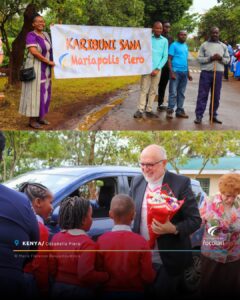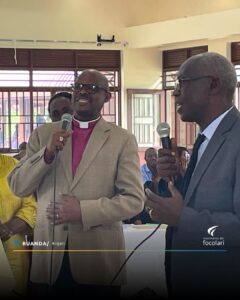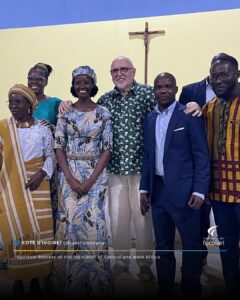
“We have lost the sense of fraternity, but this is wrong, because we are all equal even if we are different, even if our skin is a different colour. The spirituality of the Focolare teaches us to see others as brothers and sisters, because we are all children of one Father,” (Cardinal Jean-Pierre Kutwa, Archbishop Emeritus of Abidjan, Ivory Coast)
In the Ivory Coast, Christians make up about 40% of the population, whereas Muslims are 45%. The peaceful coexistence between the two religious faiths is an example for the whole region of Central and Western Africa. The Focolare Movement is committed in society to building bridges between all people Celebration!
The celebration of the 50th anniversary of the presence of the Focolare Movement in the Ivory Coast was an “international” event with dances from the different countries. The Focolare Movement arrived in the Ivory Coast in 1975 The Movement played a crucial role in protecting the population during the conflict from 2002 to 2006 and it was the little town ‘Victoria’ that welcomed and cared for people from all the parties involved. Over the years, a health centre, vocational training centres and cybercafés have been established…
A message from Margaret Karram
“…God with his infinite Love extends a new call to all of us: he invites us to build unity in the Ivory Coast with an even greater enthusiasm, being close to everyone who passes us by. Let us ask God to give us ‘a heart without borders’, capable of welcoming everyone, of loving everyone without distinction, of listening to everyone with the ears of the heart! May this celebration be an opportunity to put love back at the centre of our lives and our communities…”
Next: Sierra Leone: Jesús Morán meets with the Bishops’ Conference
“Interreligious dialogue is an expression of the evangelisation in Sierra Leone. The Focolare can help us a lot with the dialogue of life,”. (the Archbishop of 
More than 20 years after one of Africa’s bloodiest civil wars, the local Churches are committed to rebuilding both people and society. The country has about 8 million inhabitants and is one of the poorest countries, despite being very rich in minerals, diamonds and natural resources. Islam is the main religion, and Christians have very good relationships with its followers and they collaborate with one another. It is a young country: 80% of the population is under 35 years of age. The spirituality of unity was first introduced into Sierra Leone by two Xaverian missionaries the early 1990s, during the conflict, and now there are several groups of the Movement present in various cities and villages.
In Sierra Leone there is no ‘focolare house’, but there are communities of people, who live and spread the spirituality of unity. They are fully integrated in the Church and at the service of the reconstruction of the country. Working with the Churches for the rebirth of Sierra Leone Jesús Morán’s visit to Sierra Leone was an opportunity to make the charism of unity known to many people. He heard testimonies that reflect the country’s journey of reconciliation. At the centre there is forgiveness: the decision not to give in to revenge; heroic gestures of reconciliation; putting concrete love into practice, restoring dignity and helping those in poverty. The objectives of the local Church are to revive the country also in the health care sector as well as educating people to the common good and peace in society.
Margaret Karram, in a video link-up: ‘An Arab proverb says that “when there is a goal, even the desert becomes a road” and our road is to live and spread the culture of peace, generating it every day with our lives.’
Visit to Kenya and the Little Town ‘Piero’

– The nursery and primary school, in whose educational curriculum there are the key ideas of the spirituality of unity. This school now has 120 children.
– The Centre for Inculturation, where the charism of unity in dialogue with African cultures is being studied in depth.
Rwanda, the ‘Land of a thousand hills’
On the 1st of February, over 500 people, who belong to the Focolare Movement, arrived from every part of the country
so as to spend the morning sharing and being together. The testimonies spoke of the challenges of everyday life.
Margaret Karram entrusted the community with three key ideas:
– Be passionate about living the Word which forms us to a new culture and a new mentality
– Don’t remain trapped in suffering, but react with love, with concrete gestures of reconciliation
– Be protagonists and co-responsible for taking God to everyone.
Burundi
The Gishora “Sanctuary of the sacred drums”, a UNESCO World Heritage Site, is a symbol of Burundi’s culture. From the beginning of the 20th century, the sound of drums marked the rhythms of life on this sacred ground, expressing peace, joy, a sense of community and generous welcome. It was an important immersion in the Burundi culture that was offered to 
The Movement is widespread here: ‘it is present in many church and school communities across the country’. The spirituality of the Focolare arrived in 1962, but it was in the 1980s and 1990s, during the violence that devastated this region, that the Movement saw its greatest development.
In Gitega, the Co-President was welcomed by about eighty priests, seminarians, religious men and consecrated women Archbishop Bonaventure Nahimana was also present.
The priests asked Jesús Morán: “How can we live the Charism of unity in a constantly changing world?”.
He urged them to “have a vision of history characterised by wisdom, because Christ has overcome the world. There is an Orthodox theologian who says that ‘a new awakening of the Gospel corresponds to every era of dehumanisation’. Let us all be continually evangelised and convey this vision characterised by wisdom with our lives.”
Margaret Karram concluded:
“In the spirituality of unity, the life of the Word brings about a change ‘from the I to the we’. Our witness will make the Church more credible, and we will then contribute to overcoming every kind of conflict.”



